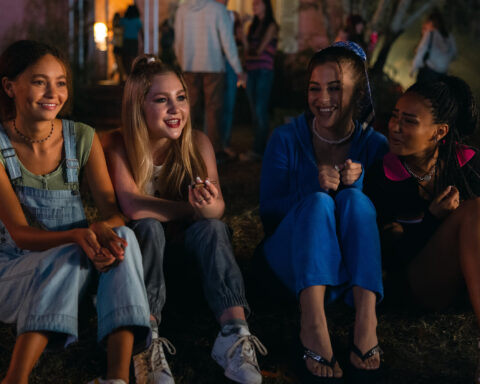I’d rather die than betray a Peruvian
A tender promise between two sisters holds the key to the heart of Klaudia Reynicke’s Sundance entry, Reinas. Betrayal underpins every dynamic on screen, from the personal drama of an ex-husband’s betrayal of his family following an uncomfortable divorce or the wider drama of Peru betraying its people following the government collapse in the early 1990s. Reynicke’s focus is not the economic turmoil but the small, human stories that are tragically caught in its midst.
Carlos (Gonzalo Molina) is a father and ex-husband struggling to make ends meet working as a taxi driver by day and a security guard by night. His wife, Elena (Jimena Lindo), is a prospering single mum thriving in her work and faces the opportunity of a lifetime to escape the difficulties of Peruvian life for the relatively high life of the USA. For Elena to bring her daughters, Lucia (Abril Gjurinovic) and Aurora (Luana Vega), with her, though, she needs the permission of Carlos, someone who will do everything he can to avoid making that decision.

In a delicate contrast to the dramatic environment of a police-state just outside their front door, Reinas thrives in the homely atmosphere created by this tight-knit Peruvian family. Their first appearance is for Aurora’s birthday for which Carlos arrives late, a regular occurrence as is quickly confirmed. In difficult circumstances, this is a family that will do whatever they must for each other and an ensemble filled with telenovela stars and complete novices sell this impressively. You feel their family history in every picture frame that surrounds them and the passing mentions of past events offer genuine depth to their relationships.
To convince an audience so impressively like this takes real skill from Reynicke’s script and direction, who offers a semi-autobiographical angle to the story following her own departure from Peru at a young age for American pastures new. Lucia and Aurora, the young daughters whom Carlos refers to as “mis reinas” (my queens), serve as composite characters for Reynicke as she draws on her own feelings of fear towards change and heading into the unknown. Having to experience so much change, especially at such a young age, cannot be easy, but Lucia and Aurora embrace that fear by leaning on each other in moments of need. Both Gjurinovic and Vega are mightily impressive throughout Reinas and more than hold their own against the far more experienced actors around them.
Reynicke balances many spinning plates throughout Reinas, which may not be immediately apparent considering it’s a relatively low-stakes drama. It’s clever to open the film with a presumably real news broadcast from the period where the economic situation is put into real-world terms (to name one, the price of a baguette, 9,000 Peruvian inti, increases to 25,000 Peruvian inti overnight) as it offers the viewer an immediate context in which to place the rest of the film. With that in mind, Reynicke moves between a coming-of-age drama for its young stars, their parents’ conflict of which they’re only partially aware, and the population of Lima’s plight living in a police-state that occurs at any given moment when they step out of the safety of their family home. It’s fascinating to watch unfold in almost real-time as their stories intertwine and overlap with every line of dialogue.

With all the authentic performances on show, it’s Gonzalo Molina who will leave the biggest impression with his quietly heartbreaking performance. Molina plays Carlos with a genuine sense of earnestness who only wants to do the best he can for his daughters. This earnestness provides even more sadness when Carlos, who is already struggling to get by, has to ensure he still receives the old price of a baguette as payment just for doing his day job. He imbues Carlos with so much heart as his daughters’ Superman (Carlos will often regale them with outlandish stories from his past to make them smile) that it’s hard not to connect with him, made even more impressive by how Molina never lets his character lose his head or even raise his voice. Molina thrives in the quiet poignancy of every moment and Reynicke’s quiet direction allows each of those moments time to breathe.
One could argue Reinas only finds fault in its final act as it feels the need to imbue a sense of urgency to its drama with a curfew-breaking adventure by Lucia and Aurora, but this isn’t where Reinas has thrived until now. Certainly, this more dramatic sequence is amplified by the seeds sewn throughout as their respective relationships all come to a head in a melting pot of near-disaster, but Reinas worked so effectively as a quiet family drama that it shouldn’t feel the need to increase the stakes in the way that it does. It’s hard to talk about Reinas without illustrating just how impressive a work this is from a young director on only her third feature film. It’s so impressive that the word has been used six times up to now. Klaudia Reynicke has crafted an authentic, poignant piece of cinema that will resonate with so many. It’s a personal, small-scale story told in the shadow of world-altering events, a perfect environment in which characters can be explored and developed. While Gonzalo Molina is likely going to earn many plaudits for his role in this touching little film, you cannot underestimate the impressive work done by the two young actresses playing his daughters. Oh, look, there’s that word again.






